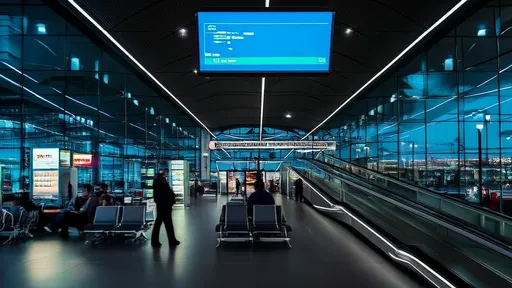In an age where environmental consciousness is increasingly at the forefront of travelers' minds, the term "eco-hotel" has become a buzzword in the hospitality industry. Yet, with the rise of greenwashing—where businesses make misleading claims about their environmental practices—discerning a genuinely sustainable accommodation from a superficially green one can be challenging. For the conscientious traveler, selecting a hotel that aligns with true ecological values requires more than a glance at a "green" label; it demands a deeper inquiry into the establishment's practices, certifications, and overall commitment to sustainability.
The journey to identifying an authentic eco-hotel begins with understanding what genuine sustainability entails. It is not merely about installing energy-efficient light bulbs or encouraging towel reuse, though these are positive steps. True ecological hospitality encompasses a holistic approach that considers energy consumption, water management, waste reduction, sourcing of materials and food, support for local communities, and preservation of natural habitats. An establishment that excels in one area but neglects others cannot claim to be fully sustainable. Therefore, travelers should look for a comprehensive strategy that addresses multiple facets of environmental and social responsibility.
One of the most reliable indicators of a bona fide eco-hotel is third-party certification. Certifications from recognized organizations provide an objective assessment of a hotel's sustainability practices. Look for credentials such as LEED (Leadership in Energy and Environmental Design), Green Globe, or EarthCheck, which have rigorous standards and regular audits. These certifications evaluate everything from building design and energy efficiency to waste management and community engagement. A hotel that has invested the time and resources to obtain such certification is likely serious about its environmental commitments. However, it is essential to research the certifying body to ensure its standards are robust and not easily obtained through superficial measures.
Beyond certifications, the physical structure and operations of the hotel offer telling clues. Sustainable architecture often incorporates passive design principles, utilizing natural light and ventilation to reduce energy needs. Renewable energy sources, such as solar panels or wind turbines, are a strong sign of dedication to reducing carbon footprints. Water conservation measures, including rainwater harvesting, greywater recycling, and low-flow fixtures, demonstrate a commitment to preserving this precious resource. Additionally, waste management practices should go beyond basic recycling to include composting, reduction of single-use plastics, and initiatives to minimize overall waste generation.
The provenance of materials and products used within the hotel is another critical factor. Eco-conscious establishments prioritize locally sourced, organic, and fair-trade products. This applies not only to food served in restaurants but also to furnishings, linens, and amenities. By supporting local artisans and producers, the hotel reduces its transportation emissions and contributes to the local economy. Furthermore, the use of non-toxic, biodegradable cleaning supplies and toiletries reflects a commitment to minimizing chemical pollution and protecting both guest health and the environment.
Engagement with and support for the local community and ecosystem is a hallmark of a genuine eco-hotel. This can take many forms, such as employing local staff, offering cultural experiences that respect indigenous traditions, and contributing to conservation projects. Some hotels actively participate in reforestation, wildlife protection, or marine conservation efforts, allowing guests to partake in these initiatives. A hotel that integrates itself into the local fabric and works to enhance rather than exploit its surroundings is likely operating from a place of authentic environmental and social stewardship.
Transparency is key when evaluating an eco-hotel's claims. Reputable establishments are usually eager to share detailed information about their sustainability practices on their websites or through available literature. They may provide reports on energy and water usage, waste diversion rates, or community contributions. If such information is vague, absent, or feels like marketing spin, it may be a red flag. Don’t hesitate to contact the hotel directly with specific questions about their policies; their willingness and ability to provide clear, concrete answers can be very revealing.
Lastly, consider the overall guest experience and how it aligns with sustainable principles. Does the hotel educate and inspire guests to adopt more eco-friendly behaviors? Are there opportunities to connect with nature in a respectful manner? An authentic eco-hotel often fosters a sense of environmental awareness and responsibility among its visitors, creating an immersive experience that goes beyond mere accommodation. From guided nature walks to workshops on sustainability, these offerings enrich the stay while reinforcing the hotel's commitment to its values.
In conclusion, choosing a truly eco-friendly hotel requires diligence and a critical eye. By looking beyond surface-level claims and investigating certifications, operational practices, sourcing policies, community involvement, and transparency, travelers can make informed decisions that support genuine sustainability. In doing so, they not only enjoy a more meaningful and responsible travel experience but also contribute to the growing demand for authentic environmental stewardship in the hospitality industry. The power to drive change lies in the choices we make, and selecting a hotel that truly walks the talk is a significant step toward a more sustainable future for travel.

By /Aug 22, 2025

By /Aug 22, 2025

By /Aug 22, 2025

By /Aug 22, 2025

By /Aug 22, 2025

By /Aug 22, 2025

By /Aug 22, 2025

By /Aug 22, 2025

By /Aug 22, 2025

By /Aug 22, 2025

By /Aug 22, 2025

By /Aug 22, 2025

By /Aug 22, 2025

By /Aug 22, 2025

By /Aug 22, 2025

By /Aug 22, 2025

By /Aug 22, 2025

By /Aug 22, 2025

By /Aug 22, 2025

By /Aug 22, 2025